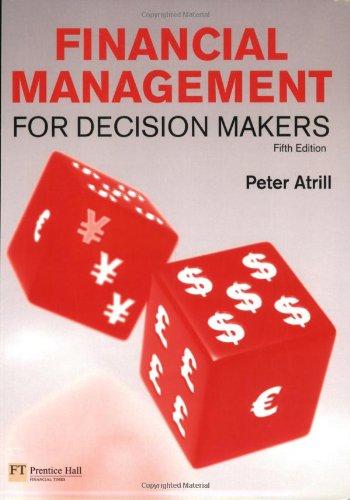The senior management of Galbraith Ltd is negotiating a management buy-out of the business from the existing
Question:
The senior management of Galbraith Ltd is negotiating a management buy-out of the business from the existing shareholders. The most recent financial statements of Galbraith Ltd are as follows:
Statement of financial position (balance sheet) as at 30 November Year 6
£
Non-current assets (cost less depreciation)
Property 292,000 Plant and machinery 145,000 Motor vehicles 42,000 479,000 Current assets Inventories 128,000 Trade receivables 146,000 274,000 Total assets 753,000 Equity
£0.50 ordinary shares 100,000 General reserve 85,000 Retained earnings 169,000 354,000 Non-current liabilities 13% loan notes (secured) 180,000 Current liabilities Trade payables 147,000 Tax 19,000 Bank overdraft 53,000 219,000 Total equity and liabilities 753,000 Income statement for the year ended 30 November Year 6
£
Sales revenue 1,430,000 Cost of sales (870,000)
Gross profit 560,000 Less Selling and distribution expenses (253,000)
Administration expenses (167,000)
Operating profit 140,000 Finance expenses (35,000)
Profit before taxation 105,000 Tax (38,000)
Profit for the year 67,000 The following additional information is available:
1 Dividends of £5,000 were proposed and paid during the year.
2 A professional surveyor has recently established the current realisable value of the business’s assets as being:
£
Property 365,000 Plant and machinery 84,000 Motor vehicles 32,000 Inventories 145,000 The current realisable value of trade receivables was considered to be the same as their statement of financial position (balance sheet) values.
3 The free cash flows of the business over the next ten years are estimated as follows:
£
Year 7 97,000 Year 8 105,000 Years 9–16 150,000 4 The cost of capital for the business is 10 per cent.
5 A similar business which is listed on the Stock Exchange has a price/earnings ratio of 8 and a gross dividend yield of 2.2 per cent.
Assume a 20 per cent rate of tax.
Required:
(a) Calculate the value of a share in Galbraith Ltd using the following valuation methods:
(i) Liquidation basis (ii) Price/earnings basis (iii) Dividend yield basis (iv) Free cash flow basis (assuming a ten-year life for the business).
(b) Briefly evaluate each of the share valuation methods set out in
(a) above.
(c) Which share valuation method, if any, do you consider to be most valid as a basis for negotiation and why?
(d) What potential problems will a management buy-out proposal pose for the shareholders of Galbraith Ltd?
Step by Step Answer:






